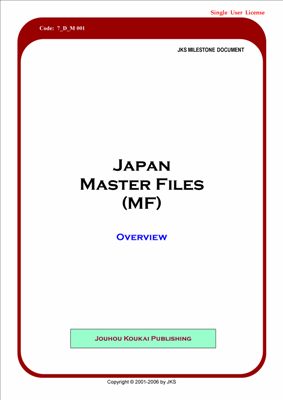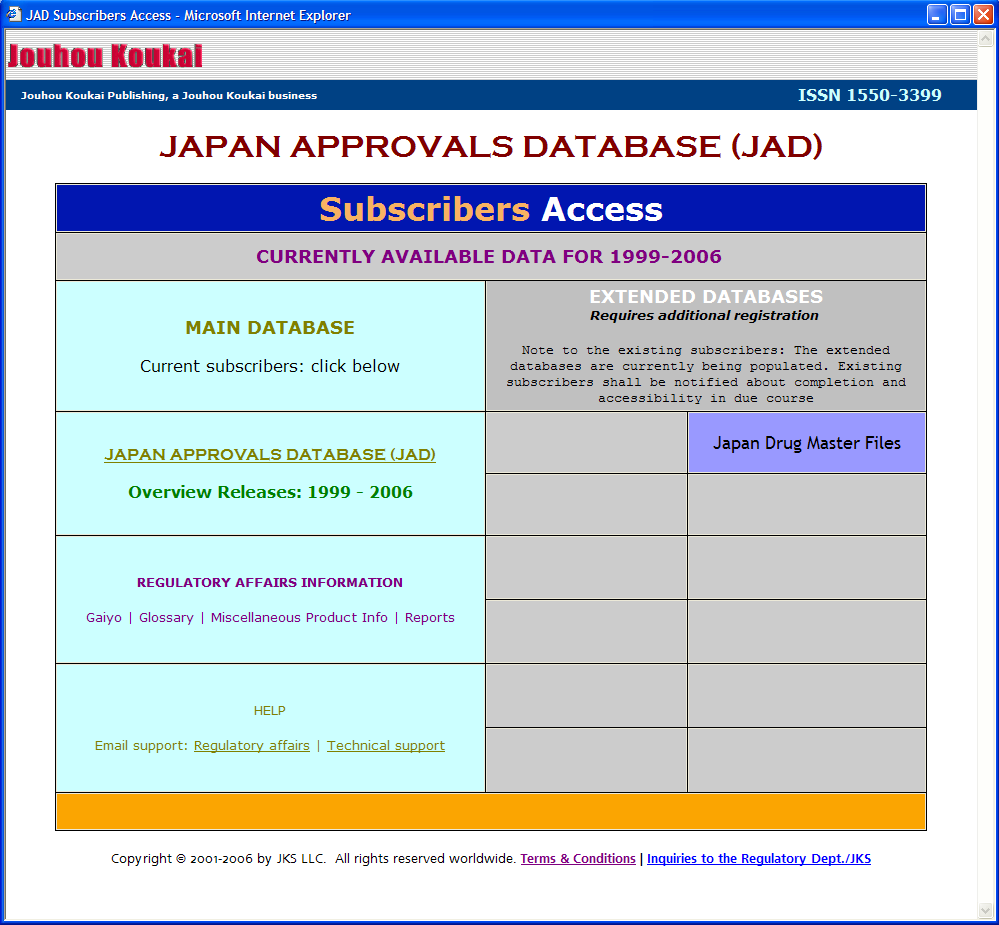|
January 20,
2007
|
|
2006: Year in
Review The key developments in 2006 were related
to new
product approvals, influx of foreign manufacturers to Japan, and
information disclosure. 
Tokyo office 2007
Major
developments
Product approvals Keywords: unapproved, orphan, CNS The Minister of Health, Labor and Welfare in 2006 granted approval for new drugs in five rounds, as in 2005, however the number of approved products and formulations (including newly approved and amended approvals for manufacturing or import) increased to 90 from 64 last year. Dominant category among the approvals was CNS drugs with both domestically-developed and overseas products. The tendency toward faster introduction of unapproved medicines was further reinforced and some of the designated by the Committee for the Examination of the Use of Unapproved Medicinal Products drugs proceeded to submission. 2006 was also successful for orphan candidates with new designations and approvals. The speedier approval of some of the orphan products such as Aldurazyme resulted from the efforts of the increasingly vocal patients advocacy groups, another commendable trend. Foreign manufacturers Keywords: market share, generics, newcomers Much maligned impenetrability of the Japanese market took several hits in 2006. The influx of foreign manufacturers into 60 billions Japan pharmaceutical market steadily continued as all foreign-capitalized drug makers now held 34% market share. The system permitting registration of Master Files - firstly introduced in the spring of 2005, considerably expanded last year. By December 2006, the overall number of registered Master Files reached 2,293, sponsored by over 600 registrants from nearly 40 countries around the world. Separately, over foreign 700 applicants took advantage from the newly introduced system for accreditation of foreign manufacturers to obtain certificates. The acknowledgment that arguably near 30% of anticancer medicine, otherwise available in the rest of the industrialized world, are not registered - and in some case, even not under development in Japan, led to a swift governmental initiative to accelerate the introduction of those foreign products, possibly best illustrated by the approval in January of Alimta after only 5 months of review by the authorities. Aside from the patented drugs, the landscape of another segment of the Japanese pharmaceutical market - generics, started to change dramatically. Lured by still disproportionally low market share of just 16% for generics in Japan, several of the largest international makers open subsidiaries or established joint ventures encouraged by the much lower than EU and North America market penetration of generics in Japan. Information disclosure Keywords: reviews, proceedings, Year 2006 was also the fifth anniversary of the enforcement of the Public Access to Information Law (PAIL) in Japan, and the progress - particularly in the field of pharmaceutical affairs has been dramatic compared to the past. Notably, among major contributors to the increased transparency is the Society for Japanese Pharmacopoeia (SJP) with its ever expanding series of information meetings where the very same Government officials and technical experts responsible for reviewing and approval process are most frequent presenters. In spite of the officially recognized understaffing of drugs and medical device reviewing offices of PMDA, the relevant drug approval documents - such as Approval (Evaluation) Review and Summary Basis of Approval (Japanese equivalent) were made publicly available much faster than previous years.
Chronology
Approval decisionsJanuary 30: MHLW competed changes in PI precautions for all anti-depressants February 23: PAFSC recommended 6 new products for approval March 8: PMDA revised clinical trials consultation procedure March 31: MHLW to require EBM data in pediatric drugs approval April 3: PAFSC recommended 6 new products for approval April 20: MHLW approved 32 new products May 31: MHLW approved 6 new products June 29: MHLW approved 13 new products July 27: MHLW approved 32 new products August 24: First Subcommittee of Drugs recommended 7 new products for approval August 25: Second Subcommittee of Drugs recommended 6 new products for approval September 22: Special Committee of Drugs recommended 17 new products for approval October 18: First Subcommittee of Drugs recommended 3 new products for approval October 19: Second Subcommittee of Drugs recommended 3 new products for approval October 20: October round of drug approvals began with 3 new products November 29-30: The First and Second Subcommittees of Drugs recommended 14 new products for approval December 25: The Science and Technology Council: the number of examiners of new drug and medical devices approval applications to increase from 2007 and to double by 2009 December 26: PAFSC recommended 25 new products for approval in January 2007
...and
2007?
More approvals, increased presence of foreign makers and better news on medical devices

Manufacturers
January 19: The Committee for the Examination of the Use of Unapproved Medicinal Products held its 7th session February 17: Current Issues in QA of Medicinal Products meeting April 27: The Committee for the Examination of the Use of Unapproved Medicinal Products held its 8th session May 19: Introduction to Japanese Pharmacopoeia XV Edition seminar held in Tokyo July 26: 14th ICH Immediate Briefing held in Tokyo July 28: The Committee for the Examination of the Use of Unapproved Medicinal Products held its 9th session - 5 new products recommended for development in Japan September 14: 23rd New Drug Evaluation Division Information Meeting held in Tokyo October 17: Current Issues in QA of Medicinal Products Autumn 2006 held in Tokyo November 1: MHLW initiates public hearing on drug approval and healthcare needs November 17: The Committee for the Examination of the Use of Unapproved Medicinal Products held its 10th session - status of 30 products updated, 3 new products added for monitoring of the domestic development December 7: Second meeting of the Study Group for Accelerating Delivery of Safe and Effective Medicinal Products held: in January 2007 the discussion to improve the approval system to enter the decisive phase December 21: 15th ICH Immediate Briefing held in Tokyo
Further readings and information
Jouhou Koukai
Services LLC is leading provider of pharmaceutical
development, regulatory and business intelligence
information on the Japanese pharma and medical device
market. The site contains the only English-language database
of medicinal products approved in Japan from 1999 until
present (Japan Approvals Database, JAD), free information
resources and the online JKS Document Store (e-documents and
e-books). |
|||||
Inquire for more information: send email to regulatory(at)jouhoukoukai.com To remove yourself from all JKS communications, please send email to tech-support(at)jouhoukoukai.com About | Disclaimer | Terms | Contact | Privacy | |||||
|
Copyright © 2001-2022 and Database Rights owned by Jouhou Koukai Services LLC. All rights reserved worldwide. | |||||
